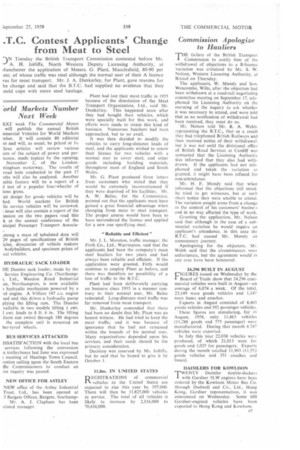T.C. Contest Applicants' Change from Meat to Steel
Page 41

If you've noticed an error in this article please click here to report it so we can fix it.
JN Tuesday the British Transport Commission contested before Mr. A. IL Jolliffe, North Western Deputy Licensing Authority, at danchester the application of Messrs. G. Plant, Macclesfield, 80-90 per ent. of whose traffic was steel although the normal user of their A licence vas for meat transport. Mr. J. A. Dunkerley, for Plant, gave reasons for he change and said that the B.T.C. had supplied no evidence that they ould cope with more steel haulage.
Plant had lost their meat traffic in 1955 because of the dissolution of the Meat Transport Organization, Ltd., said Mr. Dunkerley. This happened soon after they had bought their vehicles, which were specially built for this work, and efforts were made to retain this kind of business. Numerous butchers had been approached, but to no avail.
It was then decided to modify the vehicles to carry long-distance loads of steel, and the applicants wished to renew their licence for two vehicles with a normal user to cover steel, and other goods including building materials, throughout most of England and South Wales.
Mr. G. Plant produced three letters from customers who stated that they would be extremely inconvenienced if they were deprived of his facilities. Mr. A. W. Balne, for the Commission, pointed out that the applicants must have gained a great financial advantage when changing from meat to steel transport. The proper course would have been to have surrendered the licence and applied for a new one specifying steel.
"Reliable and Efficient"
Mr. J. L. Moreton. traffic manager, the Firth Co., Ltd.. Warrington, said that the applicants had been the company's main steel hauliers for two years and had always been reliable and efficient. If the application were granted, Firth would continue to employ Plant as before, and there was therefore no possibility of a loss of traffic to the B.T.C.
Plant had been deliberately carrying on business since 1955 in a manner contrary to their normal user, Mr. Baltic reiterated. Long-distance steel traffic was far removed from meat transport.
Mr. Dunkerley contended that there had been no doubt that Mr. Plant was an honest witness, He had tried to keep the meat traffic, and it was because of ignorance that he had not remained within the bounds of his normal user. Many organizations depended upon his services, and their needs should be the primary consideration.
Decision was reserved by Mr. Jade, but he said that he hoped to give it by October 1, 11.8m. IN UNITED STATES
REGISTRATIONS of commercial I. vehicles in the United States are expected to rise this year by 397,000. There will then be 11,825,000 vehicles in service. The total of all vehicles is likely to increase by 2,116,000 to 70,416,000.




















































































































